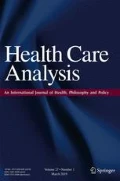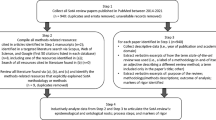Abstract
Scientism is a philosophy which purports to define what the world ‘really is’. It adopts what the philosopher Thomas Nagel called ‘an epistemological criterion of reality’, defining what is real as that which can be discovered by certain quite specific methods of investigation. As a consequence all features of experience not revealed by those methods are deemed ‘subjective’ in a way that suggests they are either not real, or lie beyond the scope of meaningful rational inquiry. This devalues capacities that (we argue) are in fact essential components of good reasoning and virtuous practice. Ultimately, the implications of scientism for statements of value undermine value-judgements essential for science itself to have a sound basis. Scientism has implications, therefore, for ontology, epistemology and also for which claims we can assert as objective truths about the world. Adopting scientism as a world view will have consequences for reasoning and decision-making in clinical and other contexts. We analyse the implications of this approach and conclude that we need to reject scientism if we are to avoid stifling virtuous practice and to develop richer conceptions of human reasoning.
Similar content being viewed by others
Notes
Note that this inference reveals an a priori assumption that science is concerned exclusively with quantifiable properties: this is not something ‘discovered’ but is assumed at the outset.
Hume [32] famously took Cartesian scepticism a stage further by questioning the external reality of causality itself.
The view that reality is devoid of value, that people’s beliefs about right and wrong correspond to nothing. The only truths concern matters of fact and there are no moral facts, so the holocaust was ‘just the Nazi’s way of doing things’ [10].
Is reviving a concept contrary to progress? Not necessarily. It was a good thing from the perspective of intellectual progress that the conceptual framework of atomism, considered in a primitive form by the pre-Socratics but convincingly criticised by Aristotle, was revived, albeit in a very different form, by modern science. We should be careful before consigning an idea once and for all to the ‘dustbin of history’.
References
Adams, D. (1992). The Hitch-Hiker’s guide to the galaxy: A trilogy in four parts. London: Pan Books.
Anscombe, E., & Geach, P. T. (1954). Descartes’ philosophical writings. London: Thomas Nelson and Sons.
Ayer, A. J. (1987). Language, truth and logic. Harmondsworth, Middlesex: Penguin Books Ltd.
Baker, L. R. (2008). A metaphysics of ordinary things and why we need it. Philosophy, 83, 5–24.
Bluhm, R. (2010). Evidence-based medicine and philosophy of science. Journal of Evaluation in Clinical Practice, 16(2), 363–364.
Boorse, C. (1977). Health as a theoretical concept. Philosophy of Science, 44, 542–573.
Boorse, C. (1997). A rebuttal on health. In J. Humber & R. Almeder (Eds.), What is disease? (pp. 3–34). Totowa: Humana Press.
Braude, H. (2011). Tacit clues and the science of clinical judgement. Journal of Evaluation in Clinical Practice, 17(5), 940–943.
Chalmers, A. F. (2003). What is this thing called science? (3rd ed.). Maidenhead: Open University Press.
Clark, S. R. L. (1988). Mackie and the moral order. Philosophical Quarterly, 39, 98–144.
Dans, A., Dans, L., & Silverstre, M. (2008). Painless evidence-based medicine. Chichester: Wiley.
Dennett, D. (2006). Breaking the spell. New York: Penguin Books.
Djulbegovic, B., Guyatt, G. H., & Ashcroft, R. E. (2009). Epistemologic inquiries in evidence-based medicine. Cancer Control, 16, 158–168.
Dupré, J. (2002). Humans and other animals. Oxford: Oxford University Press.
Dupré, J. (2003). On human nature. Human Affairs, 13, 2.
Elton, M. (2003). Dennett: Reconciling science and our self-conception. Cambridge: Polity Press.
Evidence-Based Medicine Working Group. (1992). Evidence-based medicine: A new approach to teaching the practice of medicine. Journal of the American Medical Association, 268(17), 2420–2425.
Feyerabend, P. (1975). Against method. London: New Left Books.
Fulford, K. W. M. (2001). What is (mental) disease? An open letter to Christopher Boorse. Journal of Medical Ethics, 27(2), 80–85.
Gabbay, J., & Le May, A. (2004). Evidence based guidelines or collectively constructed ‘mindlines’? Ethnographic study of knowledge management in primary care. BMJ, 329, 1013.
Gelhaus, P. (2011). Robot decisions: The importance of virtuous judgement in clinical decision-making. Journal of Evaluation in Clinical Practice, 17(5), 833–837.
Goldacre, B. (2006). Objectionable ‘objectives’. The Guardian.
Goldacre, B. (2009). Bad science. London: Harper Collins.
Goodman, K. (2003). Ethics and evidence-based medicine: Fallibility and responsibility in clinical science. Cambridge: Cambridge University Press.
Griffiths, P. E. (1998). What emotions really are. Chicago: University of Chicago Press.
Haack, S. (2003). Defending science within reason: Between scientism and cynicism. Amherst: Prometheus Books.
Hamilton, R. (2010). The concept of health: Beyond normativism and naturalism. Journal of Evaluation in Clinical Practice, 16(2), 323–329.
Hardin, C. L. (1988). Color for philosophers. Indianapolis: Hackett Publishing.
Hawking, S. (1990). A brief history of time. Chatham: Guild Publishing.
Henry, S. (2010). Polanyi’s tacit knowledge and the relevance of epistemology to clinical medicine. Journal of Evaluation in Clinical Practice, 16(2), 292–297.
Henry, S., Forman, J., & Fetters, M. (2011). How do you know what Aunt Martha looks like? A video elicitation exploring tacit clues in doctor-patient interactions. Journal of Evaluation in Clinical Practice, 17(5), 933–939.
Hume, D. (1989). A treatise of human nature. Oxford: Clarendon Press.
Hursthouse, (2001). On virtue ethics. Oxford: Oxford University Press.
Husserl, E. (1970). The crisis in European science and transcendental phenomenology. Evanston: Northwestern University Press.
Hutchinson, (2008). Shame and philosophy. Basingstoke: Palgrave Macmillan.
Hutchinson, P., & Loughlin, M. (2009). Why teach Philosophy? Chapter 3 of Kenkman, A. (Ed.), Teaching philosophy (pp. 38–54). London: Continuum.
IHSM. (1993). Future health care options, final report. London: The Institute of Health Services Management.
Kincaid, H., Dupré, J., & Wylie, A. (Eds.). (2007). Value-free science? Ideals and illusions. Oxford: Oxford University Press.
Kuhn, T. (1996). The structure of scientific revolutions. Chicago: University of Chicago Press.
Lakatos, I. (1970). Falsification and the methodology of scientific research programmes. In I. Lakatos & A. Musgrave (Eds.), Criticism and the growth of knowledge (pp. 91–195). Cambridge: Cambridge University Press.
Little, M., Lipworth, W., Gordon, J., Markham, P., & Kerridge, I. (2012) Another argument for values-based medicine. International Journal of Person Centered Medicine (in press).
Loughlin, M. (1994). Against Qualia: Our direct perception of physical reality. European Review of Philosophy, 1, 77–88.
Loughlin, A. J. (1998). Alienation and value-neutrality. Aldershot: Ashgate.
Loughlin, M. (2002). Ethics, management and mythology. Oxon: Radcliffe Medical Press.
Loughlin, M. (2004). Management, science and reality. Philosophy of Management, 4(2), 35–44.
Loughlin, M. (2008). Reason, reality and objectivity: Shared dogmas in the way both scientistic and postmodern commentators frame the EBM debate. Journal of Evaluation in Clinical Practice, 14(5), 665–671.
Loughlin, M. (2009). The basis of medical knowledge: Judgement, objectivity and the history of ideas. Journal of Evaluation in Clinical Practice, 15(6), 935–940.
Loughlin, M. (2010). Psychologism, overpsychologism and action. Philosophy, Psychiatry and Psychology, 17(4), 305–309.
Loughlin, M., Upshur, R., Goldenberg, M., Bluhm, R., & Borgerson, K. (2010). Philosophy, ethics, medicine and health care: The urgent need for critical practice. Journal of Evaluation in Clinical Practice, 16(2), 249–259.
Loughlin, M., Bluhm, R., Buetow, S., Goldenberg, M., Upshur, R., Borgerson, K., et al. (2011). Virtue, progress and practice. Journal of Evaluation in Clinical Practice, 17(5), 839–846.
MacIntyre, A. (1999). Dependent, rational animal: Why human beings need the virtues. London: Duckworth.
Mackie, J. L. (1977). Ethics: Inventing right and wrong. Harmondsworth: Penguin.
Macnaughton, J. (2011). Medical humanities’ challenge to medicine. Journal of Evaluation in Clinical Practice, 17(5), 927–932.
Marcum, J. (2011). The role of prudent love in the practice of clinical medicine. Journal of Evaluation in Clinical Practice, 17(5), 877–882.
Marx, K., & Theses on Feuerbach. Appendix to Engels, F. (1973). Ludwig Feuerbach and the end of classical German philosophy. Moscow: Progress Publishers.
Maxwell, N. (2004). Is science neurotic? London: Imperial College Press.
McDowell, J. (1998). Mind, value and reality, value and reality. Cambridge, Mass: Harvard University Press.
Miles, A. (2009). On a medicine of the whole person: Away from scientistic reductionism and towards the embrace of the complex in clinical practice. Journal of Evaluation in Clinical Practice, 15(6), 941–949.
Miles, A., & Loughlin, M. (2011). Models in the balance: Evidence-based medicine versus evidence-informed individualized care. Journal of Evaluation in Clinical Practice, 17(4), 531–536.
Miles, A., & Mezzich, J. (2011). The care of the patient and the soul of the clinic: Person-centred medicine as an emergent model of modern clinical practice. International Journal of Person Centred Medicine, 1(2), 217–222.
Miles, A., Loughlin, M., & Polychronis, A. (2008). Editorial introduction and commentary: ‘Evidence-based health care, clinical knowledge and the rise of personalised medicine’. Journal of Evaluation in Clinical Practice, 14(5), 621–649.
Mill, J. S. (1991). On liberty. In Gray, J., & Smith, G. W. (Eds.). Routledge: London.
Mittra, I. (2009). Why is modern medicine stuck in a rut? Perspectives in Biology and Medicine, 52(4), 500–517.
Nagel, T. (1986). The view from nowhere. Oxford: Oxford University Press.
Noe, A. (2009). Out of our heads. New York: Hill & Wang.
Nordenfelt, L. (2001). Health, science, and ordinary language. Amsterdam: Rodopi.
Peterson, G. (2003). Demarcation and the scientistic fallacy. Zygon: Journal of Religion and Science, 38(4), 751–761.
Place, U. T. (1956). Is consciousness a brain process? British Journal of Psychology, 47, 44–50.
Popper, K. (1989). Objective knowledge: An evolutionary approach. Oxford: Clarendon Press.
Putnam, H. (1992). Renewing philosophy. Cambridge: Harvard University Press.
Read, R. (2012). Wittgenstein among the sciences: Wittgensteinian investigations into the ‘scientific method’. Surrey: Ashgate.
Sackett, D. L., Rosenberg, W. M. C., Gray, J. A. M., Haynes, R. B., & Richardson, W. S. (1996). Evidence-based medicine: What it is and what it isn’t. British Medical Journal, 312, 71–72.
Simon, J. (2011). Progress in medicine. Journal of Evaluation in Clinical Practice, 17(5), 847–851.
Sokal, A., & Bricmont, J. (1998). Intellectual impostures. London: Profile Books.
Sorabji, R. (1983). Time, creation and the continuum. Duckworth, London: Creation and the Continuum.
Sorell, T. (1994). Scientism: Philosophy and the infatuation with science. London: Routledge.
Thornton, T. (2011). Radical, liberal values-based practice. Journal of Evaluation in Clinical Practice, 17(5), 911–988.
Timmermans, S., & Berg, M. (2003). The gold standard: The challenge of evidence based medicine and standardization in health care. Philadelphia: Temple University Press.
Tonelli, M. R. (1998). The philosophical limits of evidence-based medicine. Academic Medicine, 73(12), 1234–1240.
Tonelli, M. R. (2010). The challenge of evidence in clinical medicine. Journal of Evaluation in Clinical Practice, 16(2), 384–389.
Upshur, R. (2002). If not evidence, then what? Or does medicine really need a base? Journal of Evaluation in Clinical Practice, 2, 113–119.
Vickers, A. J. (2010). Reducing systematic review to a cut and paste. Forsch Komplementmed, 17, 303–305.
Worrall, J. (2010). Evidence: philosophy of science meets medicine. Journal of Evaluation in Clinical Practice, 16(2), 356–362.
Acknowledgments
We are extremely grateful to John Gabbay, Paul Dieppe, Peter Fenwick and Harald Walach for their astute and thoughtful comments on an earlier draft of this paper.
Author information
Authors and Affiliations
Corresponding author
Rights and permissions
About this article
Cite this article
Loughlin, M., Lewith, G. & Falkenberg, T. Science, Practice and Mythology: A Definition and Examination of the Implications of Scientism in Medicine. Health Care Anal 21, 130–145 (2013). https://doi.org/10.1007/s10728-012-0211-6
Published:
Issue Date:
DOI: https://doi.org/10.1007/s10728-012-0211-6




